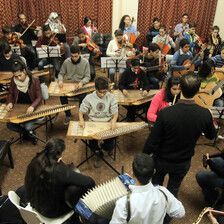The Electronic Intifada Gaza City 12 March 2014

The Watar Band performs in Gaza to an enthusiastic audience.
IPSGAZA CITY (IPS) - Like almost everyone else in Gaza, the six members of the Watar Band are angry about the Israeli-imposed blockade and the resulting misery. Except that they are expressing their anger through music — without the music itself sounding angry.
There’s much to say — and sing. More than a million and a half people in Gaza are living under a tight blockade. Poverty and widespread despair have radically increased as a result.
Unemployment is reaching high levels, particularly among graduate students. Dreams of a better and secure future lie shattered in the impoverished territory.
In these difficult circumstances, these six have chosen to express themselves through the Watar Band’s music; watar means “tune” in Arabic. The six mostly use Western instruments and sing in Arabic, English and French.
“Everything was destroyed”
Following Operation Cast Lead, the Israeli assault on Gaza in late 2008 and early 2009 which led to the deaths of more than 1,400 people and massive destruction, Ala Shoublak, founder and leading member of the band, gathered some of his musician friends together.
“Everything was destroyed, including schools, roads and buildings, and the only theater in Gaza that belongs to the Palestinian Red Crescent Society was bombed. We just decided to take our music instruments and sit on top of the destroyed theater and sing for peace and freedom despite the ugly smell of death all around.”
After that brave start five years back, the band developed further and became more structured. They bought new instruments and began to do public shows.
The group has gradually become well-known and attracted many fans, especially among school and university students in Gaza Strip.
This is not surprising, because they sing about the hopes and aspirations of youth for a better life and for a peaceful future free of conflict and siege.
The band has two clear objectives. In the words of Shoublak, they are “to resist first the occupation and the blockade through music which delivers messages of peace and freedom, and second, to communicate the hopes of the youth amid the suffering in Gaza to the outside world. That’s why we use English and French in our songs as well.”
The band has recently produced a song called “Dawsha” (meaning “noise” in Arabic) that has become very popular (see video below).
“Special experience”
Media student Mariam Abu Amer joined the band during a project called Gaza Sings for Freedom and Peace. “It was a unique and special experience to sing with Watar,” she said.
“My participation gave me the opportunity to express my dreams and hopes to my people and to the world as a young woman in Gaza. It also allowed me to encourage female participation in music bands in Gaza as it’s generally limited.”
Despite success, the band lacks the funds and professional support it needs. It’s unable to produce an album because of funding problems.
All along, the group faces the fundamental problem that in the political and economic crisis, music is not a priority. The Hamas-led government is focused on urgent humanitarian needs.
International support
Mohammed Alaraieer, director-general of the culture ministry in Gaza, said that the government is trying to “deal with the cultural needs and situation in all forms and encourage artists to focus on the just cause of Palestine and Israeli occupation but the ministry is not able to give much assistance because of the blockade and closure.”
Groups like the Watar Band therefore seek support from international organizations and institutions that are based in Gaza.
The French Cultural Center has allowed the band to use its premises for workshops and to host concerts. It has also connected Watar with European bands, and organized a cultural tour to France and other countries in Europe.
The Edward Said National Conservatory of Music teaches music and provides professional training in Gaza City.
Until recently, it had only a small a number of students attending classes but the numbers increased following Watar’s success in finding international audiences.
“Wonderful performances”
Ibrahim Al-Najar, the conservatory’s director, said that the Watar Band’s “education and good command of international languages and excellent use of social media allow them to develop their skills and present their work globally. They put on wonderful performances and deserve to be supported.”
But, he said, that success only “represents individual efforts.”
But the success is in part a result of the very difficulties Gazans face. “The youth are generally ambitious and hopeful, and success comes also out of suffering, and this is what motivated the Watar Band to form and attempt to reach international audiences, especially given that the political circumstances here have cut the world off from the people of Gaza,” said Professor Fadil Abu-Hein, who teaches psychology and sociology at al-Aqsa University in Gaza.
Periodic instances of using the arts to express resistance and anguish have been arising in Gaza. Last year Mohammed Assaf from Gaza won the Arab Idol contest.
Many who cannot fight the blockade fight it their own way through music and the arts.
All rights reserved, IPS - Inter Press Service (2014). Total or partial publication, retransmission or sale forbidden.




